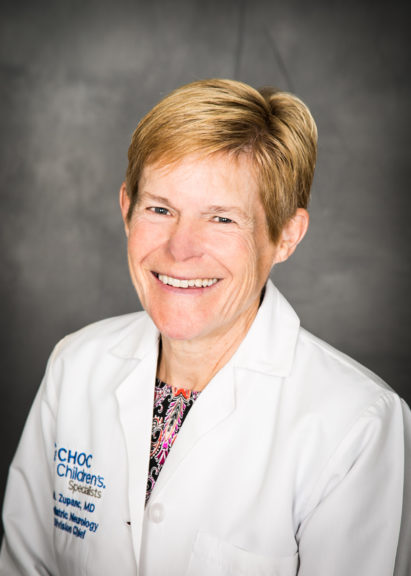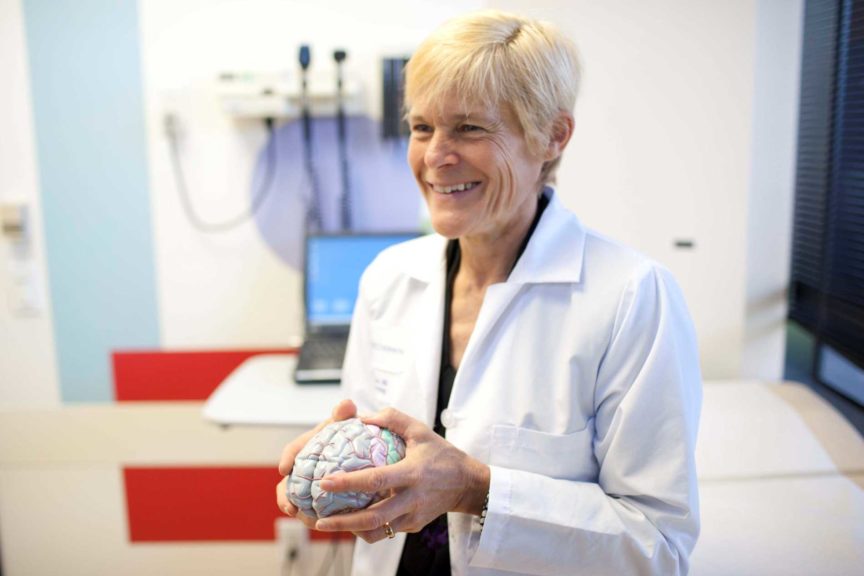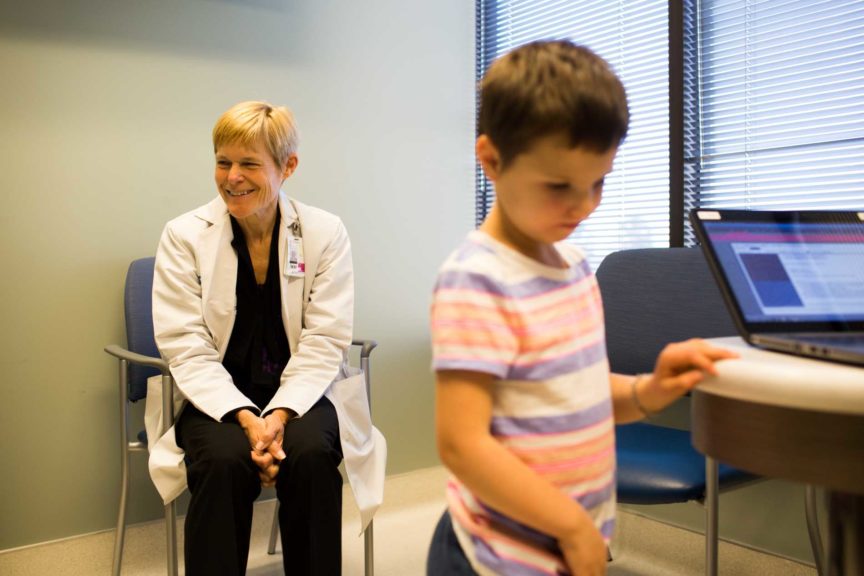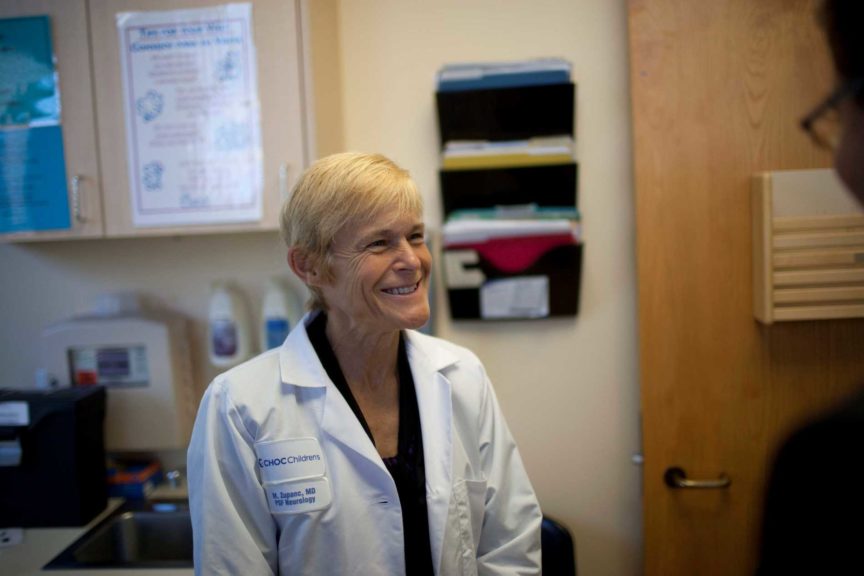Dr. Mary Zupanc has achieved many superlatives over her long career in medicine; accolades and awards have followed. But the co-medical director of the CHOC Neuroscience Institute and UCI professor of pediatrics and neurology considers the Arnold P. Gold Foundation Humanism in Medicine Award her highest honor of all.

The Child Neurology Society (CNS) has announced that Dr. Zupanc will receive this special distinction at their annual meeting in October 2021. She is only the eighth individual to be thus honored in the 50-year history of the society, which represents the nation’s pediatric neurology subspecialists.
The Humanism in Medicine Award will be presented to Dr. Zupanc — who specializes in childhood epilepsy — for practicing “extraordinary and ongoing humanism” throughout her medical career. Included in the criteria noted by her peers are:
- Compassion and empathy in the delivery of patient care
- Respect for patients, families and co-workers
- Cultural sensitivity in working with patients and family members of diverse backgrounds
- Effective, empathetic communication and listening skills
- Understanding of patients’ need for interpretation of complex medical diagnoses and treatments
- Comprehension and respect for the patient viewpoint
- Sensitivity to patients’ psychological well-being and patients’ and families’ emotional concerns
- Ability to instill trust and confidence
“You may be the greatest scientist in the world, but if you don’t have empathy and compassion for patients and families, you can’t advance the field of medicine,” says Dr. Zupanc. “To me, as a clinician bringing science to the bedside – this is the ultimate award.”
This award also has personal meaning and sentiment for Dr. Zupanc, because as a faculty member at Columbia University, she and Dr. Gold – the award’s namesake – became good friends.
“Dr. Gold was one of the kindest, gentlest, most intelligent child neurologists I’ve ever known,” she says. “He had a real compassion for children, and we just hit it off.”
Dr. Gold, who died in 2018 at the age of 92, frequently complimented Dr. Zupanc: “He went out of his way to tell me that I had taught him some things about epilepsy that he didn’t know,” she says. “I was sure that couldn’t be the case, since he was senior to me, with such knowledge and wisdom. But he insisted, and that was the kind of person he was; always offering encouragement and making people feel special.”

A trailblazer for both women and the epilepsy subspecialty
Dr. Zupanc has received many accolades over the years, including being the first woman to graduate top of class from UCLA Medical School, and at a time when women were just beginning to be have more representation in medicine. She was later named one of 10 “outstanding young women in America.” She has garnered many teaching awards from medical students and residents, and continues to be listed among the best doctors in America.
Dr. Zupanc is board-certified in four different medical specialty areas: pediatrics, neurology, neurophysiology and epilepsy. Her primary mentor, Dr. Raymond Chun, encouraged her to return to her home state of Wisconsin and become a child neurologist. Dr. Zupanc initially hesitated, but ultimately agreed, thinking it would simply be a good learning opportunity from her mentor. While there, she learned that pediatric epilepsy didn’t have many treatment options aside from a handful of drugs. However, there was exciting innovation with pediatric epilepsy surgery just starting to be performed in young children.
“Epilepsy surgery in children was in its infancy at this time, and people thought we were crazy,” Dr. Zupanc says. “The advances we’ve made since then are astonishing. We can do things we’d never dreamed of before.”
Now, she says, she feels like Sherlock Holmes when she works with a new patient. Each child is different, and a physician must determine how to best help them in terms of their specific situation – medically, socioeconomically, culturally and religiously. It’s imperative to partner with families, listen to them and come to an agreement, Dr. Zupanc says.

A legacy that goes beyond awards
Throughout her career, Dr. Zupanc has been very active in the CNS and the Child Neurology Foundation, a parent/provider advocacy group linked to the CNS. A handful of her other legacy accomplishments include her work in infantile spasms and epilepsy surgery; transitioning care of pediatric patients to adult care; and, most recently, chairing the CNS relative value unit (RVU) task force, resulting in a seminal article about physician workload, compensation and burnout.
As a clinical professor in academic medicine, she has continued to teach medical students, residents, fellows and colleagues, as well as mentor young faculty, especially women.
“Fifty percent of medical school classes are now women, but there is still a glass ceiling in terms of being leaders in our field,” she says. “We’ve come a long way, but the progress is slow. Having diversity, inclusion and equity in medicine makes the field better and stronger.”
Dr. Zupanc was recruited to CHOC 10 years ago to build the neurology division. She now considers her greatest accomplishment to be CHOC’s designation as a Level 4 Epilepsy Center – the highest level of specialization – providing “complex forms of intensive neurodiagnostic monitoring; extensive medical, neuropsychological and psychosocial treatment; and complete evaluation for epilepsy surgery, including intracranial electrodes and a broad range of surgical procedures for epilepsy.”
Since arriving at CHOC, she has grown the pediatric neurology division from four physician subspecialists to the present 16, specializing in areas such as epilepsy, sleep disturbances, movement disorders, concussion, stroke and autism. This growth has resulted in the reorganization and consolidation of the neurology division with the neurosurgery division, becoming today’s CHOC Neuroscience Institute.
In working at CHOC, Dr. Zupanc has found inspiration from helping families who believe they have no hope. When they arrive here, she says, some feel as though their lives are falling apart; their child may have difficult-to-control epilepsy or is struggling developmentally. The quality of care they receive from CHOC is transformative and changes their lives, she says.

Medical outreach, both nationally and internationally
To only give honor to Dr. Zupanc’s academic and scientific accomplishments would be to miss a great part of what her life has been about, as reflected by the Humanism in Medicine Award. Throughout her medical career, she has continually been involved in family and community outreach and advocacy; actively participated in family support groups; and developed outreach programs for underserved communities.
Her passion and advocacy have even reached beyond national borders. She was a member of the board of directors of Physicians for Social Responsibility, the American section of the International Physicians for the Prevention of Nuclear War (IPPNW), when the group was awarded the Nobel Peace Prize in 1985. In that role, she traveled with an American delegation to the Soviet Union and met with like-minded Soviet physicians to share ideas for pulling their nations back from the brink of nuclear disaster.
More recently, Dr. Zupanc traveled to India, Armenia and Vietnam on missions of teaching and providing medical care in areas where doctors are rare and medical specialties often non-existent. Back home, her passion is family-centered care, and she is a regular guest speaker at family support groups.
“My patients and their families have taught me so much,” Dr. Zupanc says. “They’ve taught me humility, how to truly listen, to be open-minded and that deeply caring for the patient and family reaps great rewards.”
“One of the wonderful things about child neurology,” she explains, “is that you often embark on a decades-long journey with families.” She still receives letters and cards from patients she treated 30 years ago. “You transform a child’s life and a family’s life. That’s what this profession is all about, and why it has always been more than a job for me. It’s a calling.”
Learn more about the CHOC Neuroscience Institute.




